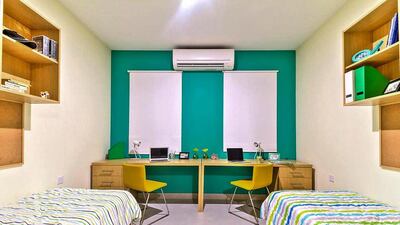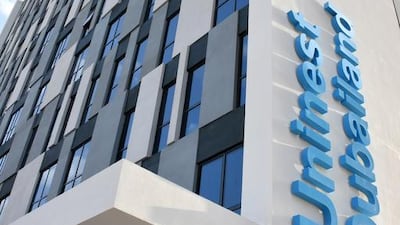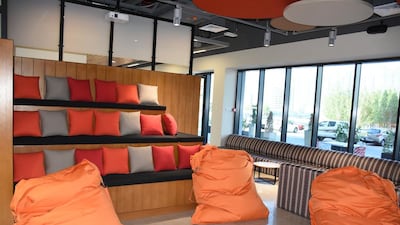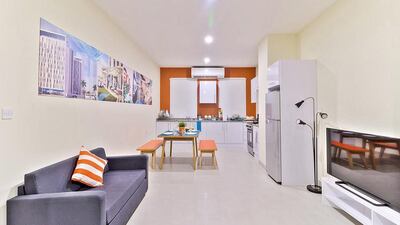The growth that has taken place in the United Kingdom’s student population over the past 15 to 20 years has quite literally reshaped cities, with purpose-built student accommodation (PBSA) providers either restoring old buildings in industrial cities or reclaiming derelict sites and replacing them with student-filled towers.
Indeed, from being the preserve of a few specialist developers, student property has developed into an asset class of its own and a wave of private equity and institutional cash has poured into the sector.
Figures provided by the law firm Addleshaw Goddard state that £6 billion (Dh32.22bn) of investment was made in the UK’s student property sector last year – double the amount spent in the previous year and much more than was invested in the bigger and more mature US market.
The reason for this has been the returns on offer. Yields for properties let directly to students – as opposed to buildings controlled by academic institutions – stand at about 6 per cent, according to the property consultancy Savills.
“In the UK, every year since the economic downturn, student accommodation has seen positive rental growth,” says James Pullan, the head of Knight Frank’s UK student property business. “No other sector can say the same.”
Mr Pullan says that two simple factors were shaping the market. Firstly, increasing affluence has led to a rise in the middle classes across the world.
“There is increasing wealth from a range of different countries and one of the things they want to spend that money on is their own children and investing in higher education.”
The other is that there is a “structural undersupply of student accommodation”, Mr Pullan says.
“Universities everywhere have not provided for all of their students. In the UK, most universities provide for up to all of their first-year students and a proportion of their postgraduate students.”
The rest often live in subdivided homes or flats originally provided for families.
One of the pioneers of the UK’s student property market was Nicholas Porter, who founded the Unite Group in 1991. Over the next 15 years, he turned it into the biggest student landlord in the UK, set up a huge investment fund and floated the company on the UK stock market. By the time he stood down as its chief executive in 2006, it had more than 3,000 staff.
Two years after his departure from Unite, Mr Porter settled in Dubai, which is now the base for his attempt to replicate the model created in the UK on an international scale through his Global Student Accommodation (GSA) Group.
It initially focused on the Australian and London market through a brand known as Urbanest but Mr Porter sold his stake in that business to his former partners.
His focus now is on the Asian market, continental Europe and on Dubai, which he sees as a hub for higher education with a catchment stretching from South Asia across the GCC and into Africa.
He says he recognised during 2006-2007 that the globalisation trend that had disrupted so many markets was also taking place in higher education.
“When I started, there were 68 million people in higher education. We’re getting closer to 200 million now and in the next 10 years we’ll have another 80 million or so coming in.
“And it’s truly globalising. There are brands of universities, who want to take education and learning to the world.” Indeed, a report published by Savills in October on the global student property market highlighted Dubai’s importance in this regard.
“The greatest concentration of branch universities in the world is in Dubai,” the report said, pointing to the more-than 30 branch campuses of universities from 11 countries setting up a branch in the emirate.
The bulk of these are within two academic free zones – Dubai Knowledge Village and Dubai International Academic City (DIAC). British universities had the strongest presence and about 60 per cent of the degrees offered were in business-related subjects, “a field in which Dubai has become a specialist provider”, it said.
GSA opened its first purpose-built student accommodation – a 424-unit block at DIAC branded as Uninest – in February at a cost of US$30 million (Dh110m). It is now looking for a second site near Knowledge Village.
Mat Green, the UAE head of research at CBRE Middle East, says the bulk of accommodation built for students in the country has been on-campus by individual universities for their own students. Also, so far, local universities have required a smaller proportion of beds for students because more live at home – but there have been occasions where demand has forced some universities to go into the mainstream residential market.
“The likes of Canadian University have taken space in Discovery Gardens,” Mr Green says.
GSA has carried out its own research, which showed that the demand for student places grew by 8.5 per cent in Dubai from 2002 to 2012, way ahead of global growth in higher education enrolments of 5.3 per cent. Dubai Knowledge and Human Development Authority (KHDA) said student numbers grew by 13.7 per cent from 2013 to 2014.
GSA also found that 22 per cent of those who study at universities in Dubai had moved from another country to do so.
The Savills report said that the proportion of international students attending branch campuses in Dubai is 57 per cent of the total.
“Dubai has been successful in attracting students from other Middle East countries, Asia, and increasingly, Africa – all huge potential growth markets,” it said.
Mr Porter believes that purpose-built student accommodation provides one of the best ways of catering for this growth.
PBSAs provide housing close to universities with all-inclusive services, which means students do not have to worry about setting up Dewa or Etisalat/du accounts for utilities. There is also an on-site gym, swimming pool, roof terraces and shuttle buses laid on to nearby campuses. Yet Mr Porter says it is the ability for them to become part of a group of friends in a city where they may not know anybody that is most appealing, with communal areas for watching TV and studying on-site.
Students can also adopt to share rooms within apartments – a twin-room in a multi-room apartment costs Dh3,290 per month, a single room Dh4,643 and a studio apartment within Uninest costs Dh6,965.
“If you go and live in a block of flats, there’s no community,” says Mr Porter.
“We know from research that one of the biggest reasons people drop out is isolation. Face time [with lecturers] is less than it used to be years ago with lecture notes and stuff, and if you go back to a studio on your own and you don’t mix with people, at a point of time, you will think, ‘What am I doing here?’”
He also says parents can be reassured their children are safe. Sleeping accommodation is gender-segregated and controlled by access cards, and there is on-site security concerned with students’ well-being.
“If we don’t see a customer for a while, we’ll be anxious and want to know what’s happened. If you’re a parent, you can always get hold of the front desk,” Mr Porter says.
The first Uninest has been funded entirely through equity provided via a Global Student Accommodation Fund, which Mr Porter created.
He says the first property was set up without raising external finance to prove the model can work. He believes that it could attract much more investment from within the region.
“The strategy for here [Dubai] is to bed this down this year. We’re actively looking at other opportunities. We see an investment programme of $200m in this market. But we want to be measured. It isn’t a rush.
“And from a Sharia point of view, we’re fantastic. We’re not having minibars with alcohol in them, we don’t stream certain things down the TV. We have none of those issues. It’s a very good investment.”
Mr Green agrees. “It’s pretty popular and it’s a good Islamic investment prospect potentially, which is why I think it could gain some traction here. [PBSA] is relatively cheap to build and modular technologies would be suited to this type of facility. So I think there are opportunities,” he says.
Moreover, Richard Walsh, a director of Colliers’ National Capital Markets team in the UK, says that several providers of purpose-built housing have been working with universities in the UK directly to build accommodation, which is leased back to them. He cites Coventry University as one example and Oxford University as another, with the latter recently agreeing to lease a block for 40 years.
Mr Walsh says that this type of deal is favoured by many investors because although yields are marginally lower than renting directly to students, they are much less risky.
“The money that is coming into that sector is huge. UK pension funds are very keen. It’s a multibillion pound business,” he says.
Mr Walsh says it is also popular with universities as it means they do not need to find the capital expenditure required to build accommodation blocks but still get to dictate how they are built, which therefore guarantees standards.
“If accommodation is substandard because it’s run by the wrong type of landlord, that has a bad reflection on the university. Here, you’ve got one system, so the whole [student] experience is controlled.”
business@thenational.ae
Follow The National's Business section on Twitter





